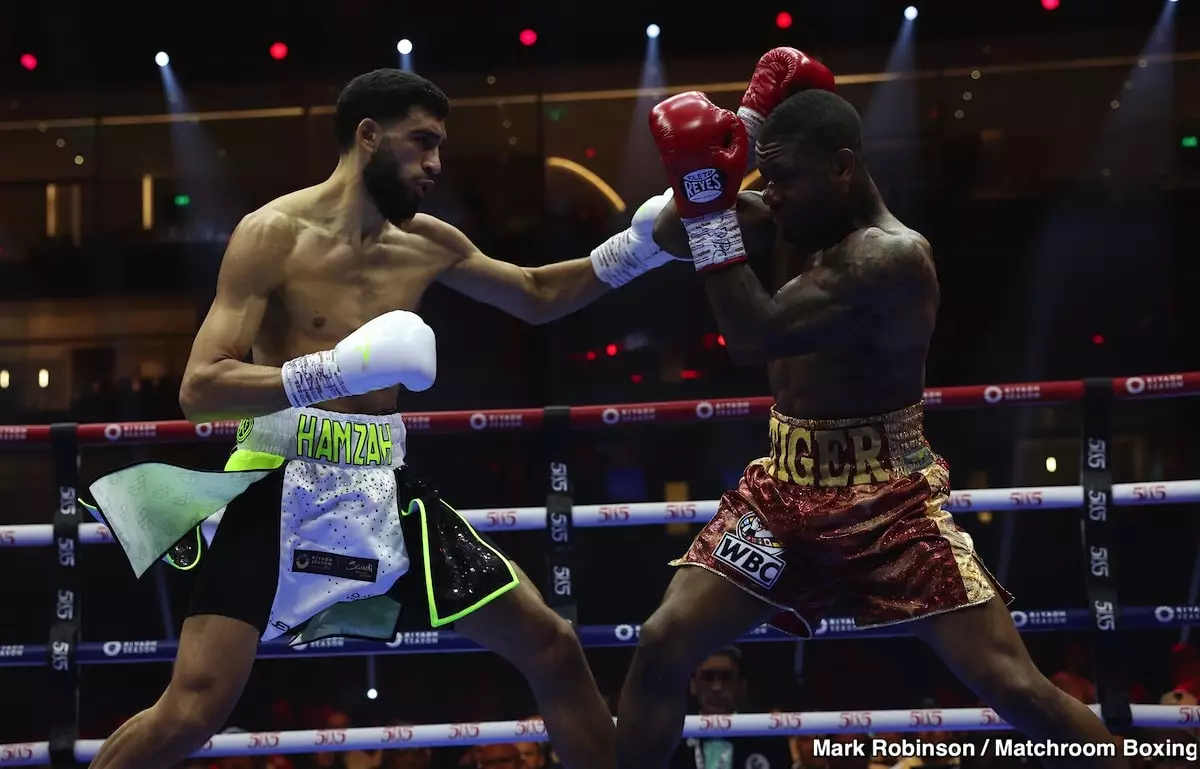In the highly competitive world of middleweight boxing, fighters often face critical decisions that can define their careers and alter their trajectories. Hamzah Sheeraz, an undefeated contender with a record of 21-0 and 17 knockouts, stands at a significant crossroad as he prepares to challenge WBC champion Carlos Adames. This decision has sparked debate among fans and analysts alike, particularly regarding his choice to avoid a bout with IBF and WBO champion Janibek Alimkhanuly, a fighter known for his daunting skill set.
Sheeraz’s choice is emblematic of a larger trend in boxing where financial considerations frequently outweigh the pursuit of glory. This financial aspect is not merely incidental; for many fighters, championship titles relate closely to lucrative fight paydays and sponsorship opportunities. Sheeraz claims that his focus on Adames isn’t a matter of avoiding the hardest challenges but rather responding to the dynamics of the mandatory rankings and the financial implications of each potential fight.
At face value, the decision to pursue Adames may seem to undermine Sheeraz’s reputation as a fierce competitor. Fans perceive Adames, ranked among the middleweights, as a weaker link compared to Janibek, who is regarded by many experts as the top fighter in the division. This context raises critical questions about how fighters select opponents in a sport often criticized for its unpredictability and the perceived prevalence of “cherry-picking.” For Sheeraz, the strategic pivot towards Adames appears aimed at solidifying his championship credentials while minimizing risks—an approach many detractors interpret as disingenuous.
In Sheeraz’s defense, the rationale behind selecting Adames could be understood as a calculated decision shaped by the competitive landscape. The path to championship glory is often laden with perilous encounters, and Sheeraz may be angling for a safer route toward securing his first title. His assertion that he has been the mandatory for the WBC belt since his knockout victory over Ammo Williams highlights a timeline that suggests his path was always intended to lead to Adames.
However, the optics of choosing Adames instead of Janibek inevitably obscure Sheeraz’s intentions. Critics argue that the current climate in boxing rewards fighters who take on high-stakes challenges and garner hefty public support through thrilling matchups. While Sheeraz’s defensive stance asserts that the fight with Adames was preordained, skeptics point to a troubling trend: a long history of fighters selecting less risky bouts to avoid being labeled as vulnerable.
This perception impacts how fans view a boxer’s legacy. If an athlete repeatedly chooses less formidable opponents, it diminishes their standing within the boxing community. Thus, even if Sheeraz’s choice was grounded in legitimate logistical factors, the insistence on pursuing Adames could be interpreted as an evasion of the more significant challenges present in the division—namely, facing fighters like Janibek or WBA champion Erislandy Lara. The narrative that arises from such decisions shapes public sentiment, leading to the characterization of Sheeraz as someone aiming to protect a potentially fragile reputation.
Hamzah Sheeraz’s remarks concerning the business side of boxing are not mere dismissals; they reflect a harsh reality. Every fighter must weigh their options carefully, particularly in an industry that demands both exceptional skill and savvy negotiation. The boxing world thrives on financial viability—the stakes are high, and one miscalculation could lead to not only diminished career prospects but also financial ruin. Thus, while many observers may view Sheeraz’s choice as cowardly, he emphasizes the need for practical business decisions, arguing it constitutes a legitimate factor influencing modern boxing dynamics.
As Sheeraz prepares to step into the ring against Adames, the implications extend beyond this single bout. His success or failure could significantly impact his marketability and future opportunities against more established champions. Should he triumph, it could validate his decision and illuminate a path for aspiring boxers who prioritize strategic opportunities. Conversely, a loss against Adames would likely intensify criticism directed towards Sheeraz, forcing him to reassess his standing in a sport that continuously demands the utmost courage and commitment.
Hamzah Sheeraz’s decision to pursue Carlos Adames highlights the intricate balancing act fighters must navigate between ambition, risk, and financial realities in the boxing arena. While fans may harbor skepticism regarding his choices, the trajectory of his career will ultimately unfold in the ring, allowing the outcomes to speak louder than the pre-fight narrative.

